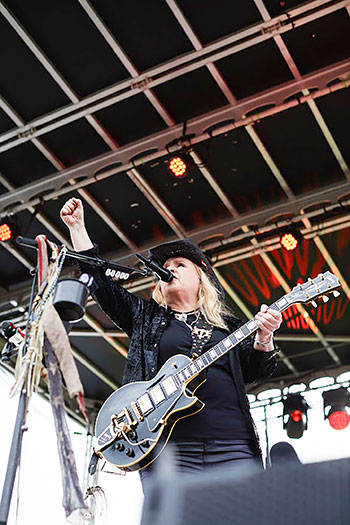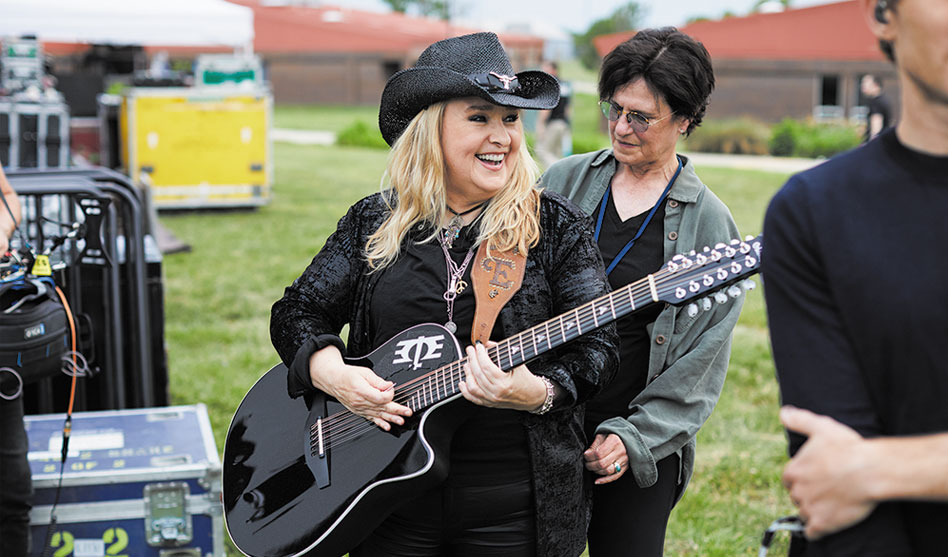Melissa Etheridge brings music to a women’s prison in new docu-series
RICH LOPEZ | Staff writer
rich@dallasvoice.com
In the new docuseries, Melissa Etheridge: I’m Not Broken, director Brian Morrow weaves an inspirational story of healing through the music of lesbian singer Melissa Etheridge with directing partner Amy Scott. The two-part series leads up to a concert Etheridge performs at the Topeka Correctional Facility, a women’s prison.
In the meantime, five female inmates write letters to the singer which she finds as inspiration for the title song.
Throughout the series, Morrow and Scott explore a number of themes that come with the women serving time such as substance abuse, trauma and grief and the trials of female incarceration, which has risen 700 percent since 1980.
But for a moment, all that is forgotten when Etheridge performs a full-on concert for the inmates.
 Melissa Etheridge: I’m Not Broken premieres Tuesday, July 9, exclusively on Paramount+. Ahead of the show, director Morrow talked with Dallas Voice about the work with both Etheridge and those in prison to tell layered and emotional stories as well as the challenges, restrictions and Etheridge’s one-day turnaround to score the show.
Melissa Etheridge: I’m Not Broken premieres Tuesday, July 9, exclusively on Paramount+. Ahead of the show, director Morrow talked with Dallas Voice about the work with both Etheridge and those in prison to tell layered and emotional stories as well as the challenges, restrictions and Etheridge’s one-day turnaround to score the show.
Dallas Voice: Thank you for talking about this series before it airs. Could you talk about how this all came together? Brian Morrow: Melissa and her manager had been trying to organize this show for a while. She grew up in Leavenworth and was affected by Johnny Cash playing the penitentiary there. That had influenced her as a child, so this show has been in her mind for a long time and making a movie about it at the same time.
A couple from our production company Shark Pig met with her to see what she was like and had in mind. We developed this piece to shop around, and fortunately MTV Entertainment and Paramount were interested.
The premise includes five women who have written to Melissa Etheridge. Was that prompted or coincidence that they wrote to her? That was our way to have sort of a plot — receiving letters from them and getting to know their circumstances. But that also led to her inspiration to write the song. These letters were really long, with many personal details. You could tell it was a cathartic process for them to put pen to paper and reflect in that way.
Being that it was set in a correctional facility, were there challenges both with filming and the letters? It was an arduous process. Any correspondence going out had to be cleared. We weren’t allowed to be involved in the selection of the women who were writing. They had to be sort of cleared to do it. And it took us a long time to get to them and coordinate coming into the prison with cameras. But we took it all very seriously.
Melissa Etheridge is of course a big queer icon —– especially to lesbian women. Were any of those writing letters identified as such? And if so, did that have any additional resonance with Melissa? None of that really came out of all this. She even asked what percentage of the population identified as queer, but they didn’t know because they couldn’t ask that. There was a sweet moment where she’s telling a story onstage and shouts “I’m a lesbian” that got a big cheer from the crowd.
The parallel here is that the show takes on addiction and substance abuse where her son died from opioids a few years ago. How did you navigate such topics? I have to first say, she’s really a fearless person. She wasn’t afraid to go into those heavy, dark places. She talks about the loss and the painful process. In a way, this shows how addiction touches all people, regardless if you are a rock star or someone who has ended up incarcerated. This population is kind of forgotten, and we respect that there are victims involved, too, which is why they are there. We don’t discount those. But it meant a lot to them that Melissa gave a shit about them to do this.
She also tackled some new ground with music on this. She wanted to do the score, and she co-composed it with Heather McIntosh. But she had never scored before. I told her not to feel obligated — she wrote the song — but she was insistent. She came in, and there were 36 cues for her, and she said, “As long as it takes.” She did it all in a day playing all these different instruments.
She has an Oscar for her song in An Inconvenient Truth. Maybe it’s time for her Emmy? I hope so!

